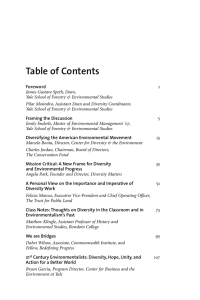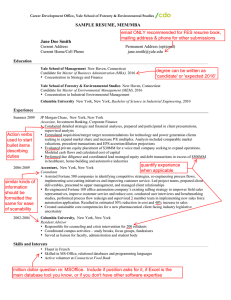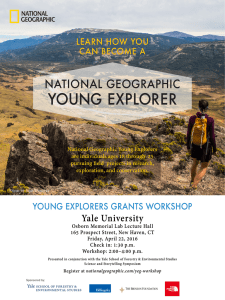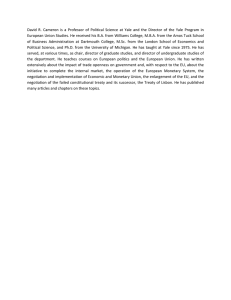Foreword
advertisement
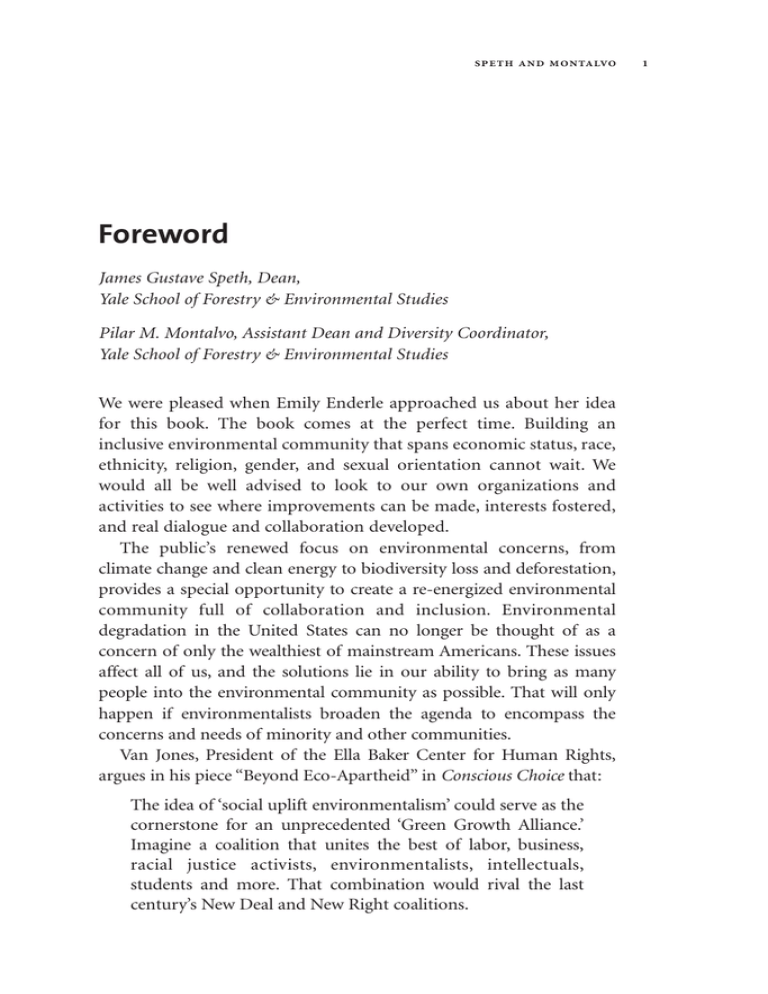
speth and montalvo Foreword James Gustave Speth, Dean, Yale School of Forestry & Environmental Studies Pilar M. Montalvo, Assistant Dean and Diversity Coordinator, Yale School of Forestry & Environmental Studies We were pleased when Emily Enderle approached us about her idea for this book. The book comes at the perfect time. Building an inclusive environmental community that spans economic status, race, ethnicity, religion, gender, and sexual orientation cannot wait. We would all be well advised to look to our own organizations and activities to see where improvements can be made, interests fostered, and real dialogue and collaboration developed. The public’s renewed focus on environmental concerns, from climate change and clean energy to biodiversity loss and deforestation, provides a special opportunity to create a re-energized environmental community full of collaboration and inclusion. Environmental degradation in the United States can no longer be thought of as a concern of only the wealthiest of mainstream Americans. These issues affect all of us, and the solutions lie in our ability to bring as many people into the environmental community as possible. That will only happen if environmentalists broaden the agenda to encompass the concerns and needs of minority and other communities. Van Jones, President of the Ella Baker Center for Human Rights, argues in his piece “Beyond Eco-Apartheid” in Conscious Choice that: The idea of ‘social uplift environmentalism’ could serve as the cornerstone for an unprecedented ‘Green Growth Alliance.’ Imagine a coalition that unites the best of labor, business, racial justice activists, environmentalists, intellectuals, students and more. That combination would rival the last century’s New Deal and New Right coalitions. 1 2 diversity and the future of the u.s. environmental movement Here at Yale’s environment school, we have recognized the importance of inclusion and diversity and are taking steps to improve our performance. The School has a strong role in training future environmental leaders. To this end, we are working to provide not only an inclusive learning environment, but also an education rich in diverse faculty, courses, research, internships, and cultural competency. We are the first to acknowledge that we are not yet where we should be. Diversity initiatives (as suggested by a committee of faculty, staff, and students in 2004) are now integrated into the School’s Strategic Plan, 2005-2009. We have had success in recruiting international students, with about one third of the student body originating from outside the United States. We have also increased our number of U.S. minority students and continue to focus strongly on this recruitment area. We do not yet “look like America,” but we are making progress. Our school has embraced Yale’s overall efforts to diversify the faculty. With a number of initiatives underway in this area, including new efforts in faculty searches and greater support for faculty collaboration and research funding, we are putting an increased emphasis on this goal. The Urban Resources Initiative (URI), based here at F&ES’ Hixon Center for Urban Ecology, is doing critical work in community-based land stewardship and environmental education in New Haven. The success of URI is based on its fundamental understanding of the importance of community participation in ecosystem management, particularly in urban environments. The excellent staff at the Yale School of Forestry & Environmental Studies, who provide the daily structure that allows F&ES to function, have not been left out of these efforts. Our staff must be diverse and must also have a high level of cultural competence. These interactions are often the foundation of student, visitor, and faculty experiences at the school. We are seeing the value of increasing our cultural competence here at the school: more support for all of our students and faculty, a developing understanding of how inclusive practices actually make organizations stronger and more relevant in today’s world, and an acknowledgement that the environmental community should be doing more to broaden its base. We are taking a big step in this area by speth and montalvo having special sessions for faculty, staff, and students designed to build our cultural competency and inclusion skills. It is definitely a learning experience for all of us, but what we’ve found so far is a real openness to the dialogue and to these issues. What we like most about Emily’s book is its potential for impact across the environmental community. Understanding the importance of diversity is a crucial aspect of the environmental movement. We are confident that readers will benefit from the excellent chapters provided by many of the top leaders in the environmental community. about the authors James Gustave Speth, Dean and Sara Shallenberger Brown Professor in the Practice of Environmental Policy. B.A., Yale University; M.Litt., Oxford University; J.D., Yale University. From 1993 to 1999, Dean Speth served as administrator of the United Nations Development Programme and chair of the UN Development Group. Prior to his service at the UN, he was founder and president of the World Resources Institute; professor of law at Georgetown University; chairman of the U.S. Council on Environmental Quality; and senior attorney and cofounder, Natural Resources Defense Council. Throughout his career, Dean Speth has provided leadership and entrepreneurial initiatives to many task forces and committees whose roles have been to combat environmental degradation, including the President’s Task Force on Global Resources and Environment; the Western Hemisphere Dialogue on Environment and Development; and the National Commission on the Environment. Among his awards are the National Wildlife Federation’s Resources Defense Award, the Natural Resources Council of America’s Barbara Swain Award of Honor, a 1997 Special Recognition Award from the Society for International Development, the Lifetime Achievement Award of the Environmental Law Institute, and the Blue Planet Prize. Publications include Global Environmental Governance, Red Sky at 3 4 diversity and the future of the u.s. environmental movement Morning: America and the Crisis of the Global Environment, Worlds Apart: Globalization and the Environment and articles in Foreign Policy, Foreign Affairs, Environmental Science and Technology, the Columbia Journal World of Business, and other journals and books. Pilar M. Montalvo, Assistant Dean, Yale School of Forestry & Environmental Studies (F&ES). B.A., Connecticut College; M.A. George Washington University; M.A. Harvard University. Ms. Montalvo’s academic training is in social anthropology with a focus on indigenous peoples in the Americas particularly along the issues of ethnicity and nationalism. She has held several different research positions at the Smithsonian Institution, including work in the repatriation of Native American human remains and sacred objects. Before coming to F&ES, Ms. Montalvo served as the Repatriation Coordinator for the American Indian Ritual Object Repatriation Foundation. She has also taught undergraduate anthropology courses at Connecticut College and Southern Connecticut State University on the issues of indigenous ethnicity, nationalism, politics, and gender. As Assistant Dean at F&ES, Ms. Montalvo handles special projects for the dean and serves as his liaison, providing direction and assistance to the faculty, staff, students, alumni/ae, Yale community, other universities, corporations, donors, government officials and visitors. She is the Diversity Coordinator at F&ES and in this capacity coordinates all aspects of U.S. minority student recruitment, alumni/ae relations, and faculty hiring and serves as a confidential resource for students, faculty, and staff.
